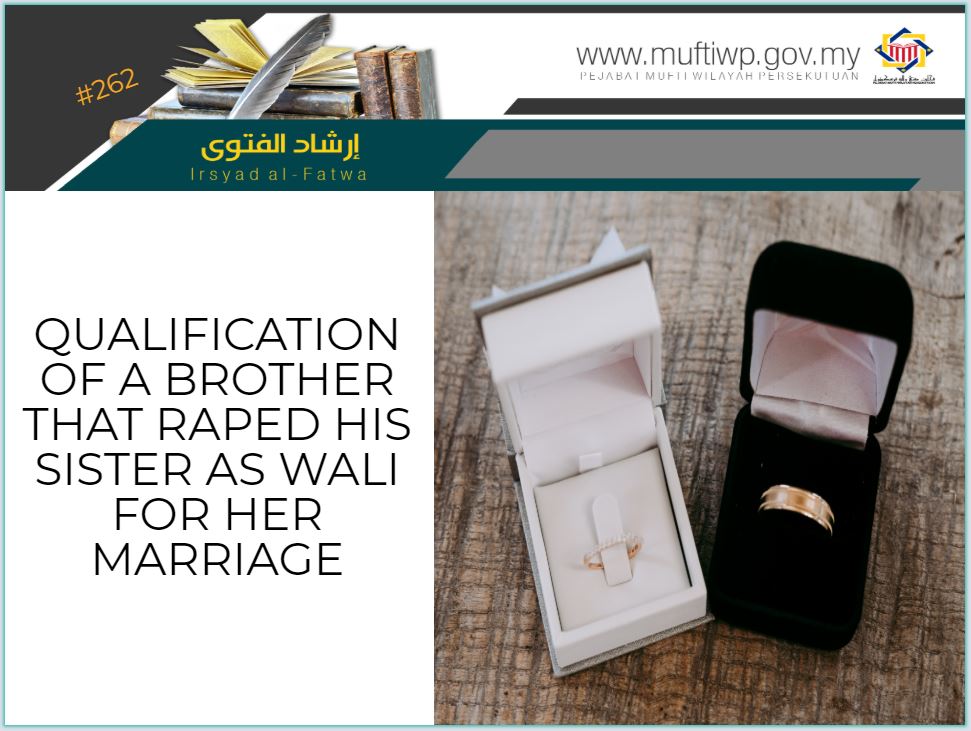Question:
Assalamualaikum. I have a question. Is a brother that raped his sister qualified to be her wali for her marriage? If his sister refuses to let him be her wali, is that permitted? Thank you in advance.
Answer:
Waalaikumussalam. Alhamdulillah, praise and thanks to Allah for the many countless blessings He has blessed us all with. Blessings and salutations to the prophet Muhammad PBUH, his family, companions and all those that follow his teachings to the day of judgement.
One of the prerequisites of nikah (marriage) in Islam is the presence of wali. Wali (guardian) means someone that has the authority over someone under his care. This is according to hadith from Abu Musa al-Asy’ari:
لاَ نِكَاحَ إِلاَّ بِوَلِيٍّ
The Messenger of Allah said: "There is no marriage except with a Wali."
Sunan al-Tirmizi (1101), Sunan Abu Daud (2085) and Ibnu Majah (1880)
Imam al-San’ani said this hadith states that a marriage is invalid unless with the presence of wali. It disclaims the validity of the marriage, and not the perfection of it. Refer Subul al-Salam Syarh Bulugh al-Maram min Adillah al-Ahkam (4/453)
This clearly shows the need to have a wali as the main prerequisite to ensure the validity of the marriage. There are eight prerequisites for someone to be a wali and one of them is that person cannot be a fasiq.
Fasiq means committing great sins purposely with his own intention and choice, or always committing minor sins. Refer al-Taqrirat al-Sadidah Qism al-Ahwal al-Sakhsiah Daurah Edition (pg.15)
A person that is not a fasiq means someone that hasn’t commit any great sin or always in minor sins. And he must not have done anything that is considered disgraceful such as peeing in public places.
Al-Khatib al-Syarbini said:
“There is no marriage in the presence of wali that is a fasiq except in the opinion of Imam Abu Hanifah. Whether the wali is mujbir or not, fasiq due to him drinking alcoholic beverages or not. The same goes whether he publicize it or not (his sins)” Refer al-Iqna’ Fi Hilli Alfaz Abi Syuja’ (pg 552)
Generally, someone that is fasiq cannot be a wali for his daughter or sister or any of his relatives, and the responsibility would move to someone else or another wali equal to him such as other biological brothers that will be his replacement. As an addition we state the order for wali below:
- Biological father
- Grandfather on the father’s side and upwards
- Brother (same parents)
- Brother (same father)
- Nephew (same parents)
- Nephew (same father)
- Son of nephew (same parents)
- Son of nephew (same father)
- Uncle on father’s side (same parents)
- Uncle on father’s side (same father)
- Great uncle on father’s side same parents as the grandfather
- Great uncle on father’s side same father as the grandfather
- Great-great uncle on father’s side same parents as the grandfather
- Great-great uncle on father’s side same father as the grandfather
- Son of uncle on father’s side same parents (male cousin)
- Son of uncle on father’s side same father (male cousin)
- Grandson of uncle on father’s side same parents
- Grandson of uncle on father’s side same father
- Child of great uncle on father’s side same parents as the grandfather
- Child of great uncle on father’s side same father as the grandfather
- Magistrate guardian/regent
However, contemporary scholars have a slightly different opinion. They said that it is very difficult to find anyone that really fulfils all the prerequisites to be a wali nowadays. This is due to the fact that faith changes, sometimes it increases and sometimes it decreases. It increases with good deeds and decreases by sins. If he repents, truly, fulfilling all the requirements of repenting, then he can be a wali and the marriage will be valid. Among those that holds this opinion is Imam al-Ghazali. We have discussed about this issue in al-Kafi series 693 and 762. [2]
Still, if his sister refuses to let him to be her wali due to dreadful memories of the past, we suggest to first try to find another brother and if she doesn’t have any, refer to marriage department of the Religious Islamic Department and wait for the court’s decision of whether or not the responsibility of the wali could move to someone else.
Wallahua’lam.
References
(1) al-Kafi 693:http://muftiwp.gov.my/ms/artikel/al-kafi-li-al-fatawi/2251-al-kafi-693-hukum-perkahwinan-berwalikan-seorang-perokok
(2) al-Kafi 762 : http://muftiwp.gov.my/ms/artikel/al-kafi-li-al-fatawi/2470-al-kafi-762-wali-fasiq-menikahkan-anaknya


